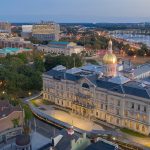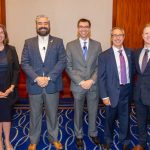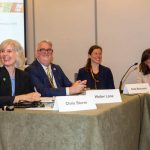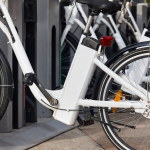New Jersey Future Blog
To Reduce Greenhouse Gas Emissions, We Need to Drive Less—and Build Smarter
October 14th, 2020 by Tim Evans
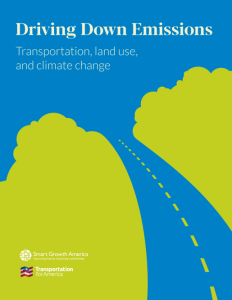 We are not going to meet our greenhouse gas reduction goals through electric vehicles alone; we need to find ways to allow people to drive less. A new report from Transportation for America, Driving Down Emissions: Transportation, Land Use, and Climate Change, makes clear that the amount of carbon we pump into the atmosphere still depends on how much we drive, which in turn depends on where and how we build things.
We are not going to meet our greenhouse gas reduction goals through electric vehicles alone; we need to find ways to allow people to drive less. A new report from Transportation for America, Driving Down Emissions: Transportation, Land Use, and Climate Change, makes clear that the amount of carbon we pump into the atmosphere still depends on how much we drive, which in turn depends on where and how we build things.
The report reminds us that the amount of driving people do is not an immutable background condition that we must simply factor into other calculations. Rather, travel behavior is a direct result of signals sent by the public sector about how people are expected to travel. Federal and state government policies that favor car travel over other modes of transportation, and that prize mobility (increasing vehicle speed) over accessibility (reducing trip distances by bringing destinations closer together), induce people to drive more and to walk, bike, or ride public transit less. The focus on vehicle throughput manifests itself in road design that treats pedestrians as an afterthought (at best) and makes walking unsafe in too many places.
Travel behavior is also influenced by local government land-use decisions that place different kinds of destinations far apart from each other, through single-use, low-density zoning, and branching street networks that funnel traffic onto a few high-speed arterial roads, even for local trips. Never mind that the state’s existing mixed-use, walkable communities with traditional downtowns, grid street networks, and a variety of housing types have accounted for most of New Jersey’s population growth over the last decade; building more of this kind of development would not pass muster with the zoning code in most places today. The Transportation For America report points out that “We can make a significant dent in the growth of emissions simply by satisfying the pent-up market demand for affordable homes in the kinds of walkable, connected communities where residents drive far less each day than their counterparts in more sprawling locations.” Putting more homes, stores, and offices in places where people can walk (or take shorter car trips) is a win-win.
This is especially true for lower-income households who would prefer not to incur the expense of driving everywhere (let alone purchasing an electric vehicle) but who cannot afford the high price of entry into many walkable towns, thanks to zoning that restricts the supply of housing, pushing prices upward. Electrifying the vehicle fleet would, on its own, do nothing to address these problems.
If we want a more equitable solution to greenhouse gas emissions—and want to help solve the lack of supply and diversity of housing options at the same time—we need to make reducing vehicle-miles traveled an explicit goal of the transportation system and remind transportation officials that, ultimately, it’s people—not cars—that need to get from one place to another. We need to be mindful that there are plenty of households whose difficulties with the current transportation system will not be solved simply by electrifying all our cars and trucks. We need to invest in our public transportation system and to make walking and biking safer, so more people have options beyond driving. And we need to confront the system of local land-use rules that make low-density, single-family detached housing and car-dependent commercial strips the default development pattern and instead make it easier to accommodate new population and job growth in the kinds of compact, walkable centers that people already desire.
Related Posts
Tags: climate change, driving down emissions, Land use, Transportation, Transportation for America


